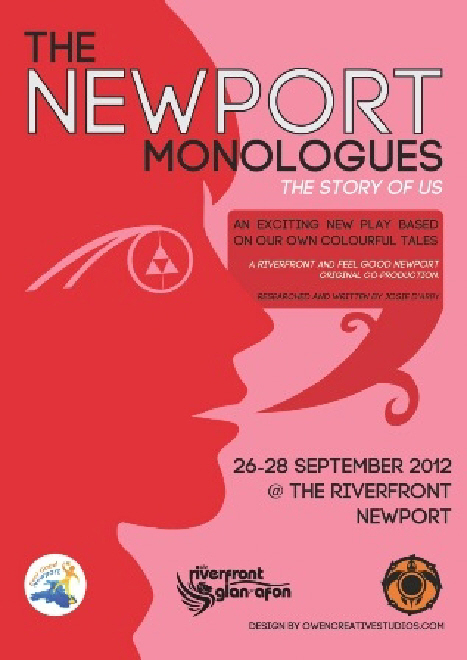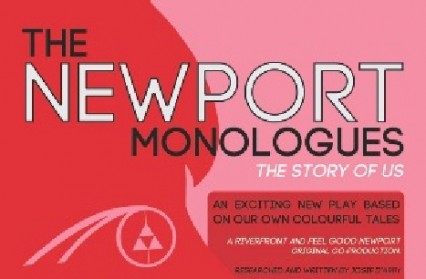
Lynda Nash attends a performance of The Newport Monologues, a play in collaboration with Feel Good Newport and The Riverfront, Newport.
I have a soft spot for Newport. My father was brought up in Pillgwenlly. He tells me tales of swimming in the Usk in a woollen bathing suit, and of running to the top of Marian Street to Fred’s bakehouse for bread pudding and finger rolls for breakfast, straight from the oven. Once a week, after school, my grandmother would give my father a large bowl, which he’d carry up Adeline Street for old Mrs Minty to fill with faggots from a tray and peas from the cauldron that swung from her black lead grate over a lump of blazing coal – it cost half a crown. He tells me how his grandmother’s house was split in two by a German bomb, and how he lay on top of his brother in the schoolyard during an air raid. It was stories like these I was expecting to hear at the Riverfront. I expected to hear how Newport fared when she wasn’t Cardiff’s poorer sister. When Newport was a community. When she was a town.
The Newport Monologues told the stories of a diverse selection of people. Five actors took on thirteen characters and did a superb job of giving us an insight into their lives. Andreas Constantinou portrayed an Indian boy uprooted by his parents and brought to Newport by boat, Rose Shepherd narrated a Jamaican woman’s journey to Newport for work, Paul Jenkins gave us the ghost of poet W.H. Davies, Natalie Paisey and Isla Johns played rival grandmothers having a day out at the park.
But as interesting as these stories were, they were not about Newport. These characters could have been from any town in any country. I wanted details: street names, shop names, school names. I wanted to hear what these people did in Newport – but, for the most part, the monologues told the characters’ history. I wanted Newport history. I wanted to hear about the people who’d ‘never been to the top of town’: I wanted my father up there telling stories. The audience, though reluctant, at first, to clap or laugh, towards the interval, began to warm to the actors and were soon enjoying themselves, and I wondered if, perhaps, I’d got the wrong end of the proverbial stick. Was I missing the point?
The play began with a ‘planning meeting’ and I expected to hear how Newport could be improved in 2012. I wanted the characters to argue and debate. But this wasn’t a real council meeting and the show was for entertainment purposes only.
It’s ten years since Newport became a city. The monologues were based on recent interviews with real Newport citizens. There were topical references to Bouncers (the TV programme that showed Newport club life at its worst; the big Tesco (that had ‘appeared like a mothership’) and free carrier bags. Isla Johns – who, ironically, was born and bred in Cardiff – gave a powerful and heart-
I feel for Newport – probably too strongly; she’s been dealt a bad hand. Recently I was contacted and asked by the group Say it About Newport, an initiative set up to find out what Newportonians really think about their city and what they would say to Newport City Council if asked their opinion. I was asked to write something using the words of those people, many of whom think the best thing about Newport is the M4 out.
The Newport monologues pledged a ‘touching, heart-
For more performances at The Riverfront, Newport, click here.
Wales Arts Review has various performance arts articles available to read.












